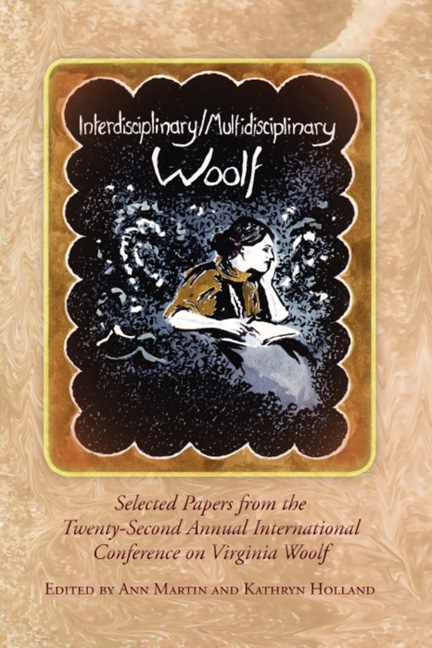Book contents
- Frontmatter
- Contents
- Introduction to Interdisciplinary/Multidisciplinary Woolf
- Acknowledgments
- List of Abbreviations
- History, Materiality, Multiplicity
- Multidisciplinary Woolf / Multiple Woolfs?
- Woolf, History, Us
- “Full of Experiments and Reforms”: Virginia Woolf, John Maynard Keynes, and the Impossibility of Economic Modeling
- Desiring Statues and Ambiguous Sexualities in Jacob's Room
- Challenging the Family Script: Woolf, the Stephen Family, and Victorian Evangelical Theology
- History as Scaffolding: Woolf's Use of The Times in The Years
- Vincent van Gogh, Virginia Woolf, and Old Shoes: A Cross-Cultural Iconography of Historical Truama from the Great War to the Iraq War
- Stopped at the Border: Virginia Woolf and the Criminalization of Dissent in Democratic Societies
- “Q. And babies? A. And babies”: On Pacifism, Visual Truama, and the Body Heap
- Photography, History, and Memoir of the Spanish Civil War: Interdisciplinary Views
- Patterns, Practices, Principles
- Art, Influence, Embodiment
- Publishing, Politics, Publics
- Notes on Contributors
- Conference Program
Woolf, History, Us
from History, Materiality, Multiplicity
- Frontmatter
- Contents
- Introduction to Interdisciplinary/Multidisciplinary Woolf
- Acknowledgments
- List of Abbreviations
- History, Materiality, Multiplicity
- Multidisciplinary Woolf / Multiple Woolfs?
- Woolf, History, Us
- “Full of Experiments and Reforms”: Virginia Woolf, John Maynard Keynes, and the Impossibility of Economic Modeling
- Desiring Statues and Ambiguous Sexualities in Jacob's Room
- Challenging the Family Script: Woolf, the Stephen Family, and Victorian Evangelical Theology
- History as Scaffolding: Woolf's Use of The Times in The Years
- Vincent van Gogh, Virginia Woolf, and Old Shoes: A Cross-Cultural Iconography of Historical Truama from the Great War to the Iraq War
- Stopped at the Border: Virginia Woolf and the Criminalization of Dissent in Democratic Societies
- “Q. And babies? A. And babies”: On Pacifism, Visual Truama, and the Body Heap
- Photography, History, and Memoir of the Spanish Civil War: Interdisciplinary Views
- Patterns, Practices, Principles
- Art, Influence, Embodiment
- Publishing, Politics, Publics
- Notes on Contributors
- Conference Program
Summary
History was the focus of my very first presentation at a Woolf conference, at Bard College in 1994. The motivation for that paper was a chance remark by a very UnWoolfian administrator at my own university: “£500 a year? What would that mean now? $100,000? $500,000? Woolf was so out of touch with real life.” My response was captured in my title “Opening Historical Doors to the Room.” To understand Woolf's metaphor, and the material foundation that supported it, I argued, we needed to engage both monetary and psychological conversion: in addition to knowing what £500 would mean in 1990s dollars, we needed to know more about Woolf's attitude to money, plus “what, in 1928/9, £500 would buy” (210).1 Remembering that paper, I am struck by at least two observations that are pertinent today: that motivations for writing are often attempts to dispute problematic assumptions, and that, while history itself is now a contested approach, it is also a valuable tool in entering the fray.
My present paper is prompted by another need to speak back to another deliberately provocative remark, one made by Eric Hayot at the 2011 conference of the Modernist Studies Association: “Nobody doing historical work has added anything new to our understanding of modernism.” What followed was a heated exchange, but such controversy isn't out of place at MSA. Subsequently, Hayot wrote a more moderate, but indeed more challenging, critique of historical studies, published in a special issue of New Literary History devoted to a re-examination of “context.” Introducing the issue, editor Herbert F. Tucker admits that the problem lies in an “historical contextualism narrowly construed,” and he expresses his hope that a revivified sense of context would be “capable of sponsoring inquiries freshly elastic in outlook and vitally close in their findings” (vii). Nonetheless, at least some of the essays attack current historical work for restrictive practice, and verge on a call for a “posthistoricist” turn (Felski 576). Eric Hayot argues that periodization instantiates a “logics of totality” and embeds “the concepts of originality, development, and belatedness” by “emplotting” historical narratives with “beginnings, middles, and ends” (745).
- Type
- Chapter
- Information
- Interdisciplinary/Multidisciplinary Woolf , pp. 13 - 19Publisher: Liverpool University PressPrint publication year: 2013



